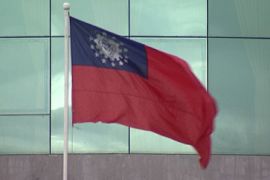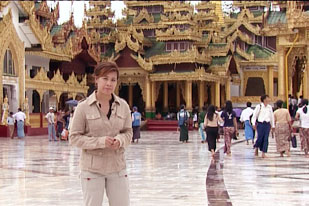Al Jazeera inside Myanmar
Al Jazeera’s Veronica Pedrosa on reporting from Myanmar – a country normally closed to foreign journalists

 |
| Al Jazeera was given rare access to film inside Myanmar |
Al Jazeera presenter Veronica Pedrosa on obtaining permission to report from Myanmar – a country normally closed to foreign journalists:
Myanmar, formerly Burma, is run by a military dictatorship.
Its leaders are reclusive, and although it is not closed to foreigners, independent reporters are rarely allowed into the country.
It was months after our original request before Myanmar’s government eventually granted Al Jazeera permission to report from the country.
Once we had arrived in the country, we spent three days in the former capital, Yangon, filming as much as we could while closely monitored by two government minders.
They prevented us from filming numerous times and tried to stop us from meeting anyone on our own.
We continuously requested interviews with government ministers on a number of issues challenging the country.
On the fourth day of our visit, a foreign ministry official agreed to talk over our intentions.
|
We fully understand the nature of media and we do not ask to be biased for us. Yet, we hope that your news reports on Myanmar will be balanced and fair reflecting the background history, actual conditions and situations Brigadier-General Kyaw Hsan, |
Two days later we were told we were to fly to Naypidaw with our escorts and that we would be granted an interview with the minister of information.
At the meeting, Brigadier-General Kyaw Hsan, the minister, explained why it had allowed us to report in the country.
We believe the Myanmar government saw letting our crew in as an opportunity. Why? Because they think Al Jazeera is anti-American.
The minister proceeded to answer all of our questions at length.
Our conversation touched on the detention of Aung San Suu Kyi, the country’s opposition leader; the long-delayed road map to democracy; the shifting of the capital; insurgencies around the country; and the effect of sanctions and the lack of aid to Myanmar’s people.
We were then given permission to film, within limits and with numerous escorts, in Naypidaw itself.
Returning to Yangon, meetings were choreographed with the leadership of three government-backed “non-government” organisations.
We also sought meetings with pro-democracy activists, several of whom turned down requests for interviews because they were suspicious that we had been granted permission to report by the government.
In the end we managed to secretly meet a leader of the main opposition group, Aung San Suu Kyi’s National League for Democracy. He asked us to disguise his identity for fear of government harassment.
The only ordinary citizen who was willing to be interviewed without disguising his identity was a former political detainee. Dr Khin Zaw Win spent 11 years in prison for his human rights work.
He continues to be an activist, particularly on Aids issues, but he is an opponent of Western sanctions on Myanmar.
For that he is criticised by some in the opposition.
His is a difficult and lonely path, neither loyal to the government, nor to the mainstream opposition.
The difficulty we had in getting the views from all sides of Myanmar politics sharply illustrated, for us, the polarisation of the society, the isolation of the country and the depth of the political stalemate.